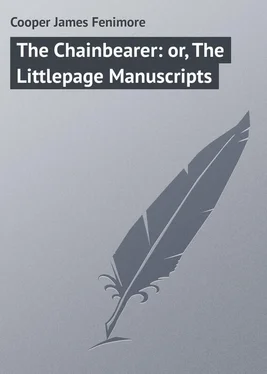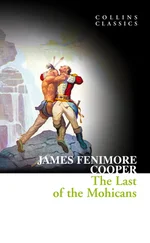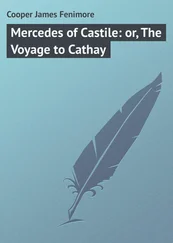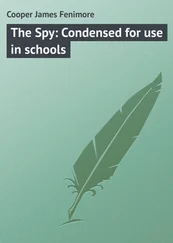James Cooper - The Chainbearer - or, The Littlepage Manuscripts
Здесь есть возможность читать онлайн «James Cooper - The Chainbearer - or, The Littlepage Manuscripts» — ознакомительный отрывок электронной книги совершенно бесплатно, а после прочтения отрывка купить полную версию. В некоторых случаях можно слушать аудио, скачать через торрент в формате fb2 и присутствует краткое содержание. Жанр: foreign_prose, на английском языке. Описание произведения, (предисловие) а так же отзывы посетителей доступны на портале библиотеки ЛибКат.
- Название:The Chainbearer: or, The Littlepage Manuscripts
- Автор:
- Жанр:
- Год:неизвестен
- ISBN:нет данных
- Рейтинг книги:5 / 5. Голосов: 1
-
Избранное:Добавить в избранное
- Отзывы:
-
Ваша оценка:
- 100
- 1
- 2
- 3
- 4
- 5
The Chainbearer: or, The Littlepage Manuscripts: краткое содержание, описание и аннотация
Предлагаем к чтению аннотацию, описание, краткое содержание или предисловие (зависит от того, что написал сам автор книги «The Chainbearer: or, The Littlepage Manuscripts»). Если вы не нашли необходимую информацию о книге — напишите в комментариях, мы постараемся отыскать её.
The Chainbearer: or, The Littlepage Manuscripts — читать онлайн ознакомительный отрывок
Ниже представлен текст книги, разбитый по страницам. Система сохранения места последней прочитанной страницы, позволяет с удобством читать онлайн бесплатно книгу «The Chainbearer: or, The Littlepage Manuscripts», без необходимости каждый раз заново искать на чём Вы остановились. Поставьте закладку, и сможете в любой момент перейти на страницу, на которой закончили чтение.
Интервал:
Закладка:
"And the money thus appropriated has gone to its destination?" I asked, on returning the letter.
"Every copper has thus gone, major, or will soon go. When the First Congregational, of Ravensnest, is up, you can contemplate the house with the satisfaction of knowing that your own money has largely aided in the good work of its erection. What a delightful sentiment that must awaken! It must be a great blessin' to landlords, to be able to remember how much of their money goes for the good of their fellow-mortals."
"In my case, it certainly should, as I understand my father, and indeed have myself seen, by the accounts rendered to me, that not one dollar of rent has ever yet left the settlement, to go into the pocket of the owner of the estate – nay, that the direct outlays of my grandfather were considerable, in addition to the first cost of the patent."
"I do not deny it, major; I do not deny it. It is quite probable. But, you will consider what the spirit of Public Improvement demands; and you gentlemen-proprietors nat'rally look forward to futur' generations for your reward – yes, sir, to futur' generations. Then will come the time when these leased lands will turn to account, and you will enj'y the fruits of your liberality."
I bowed, but made no answer. By this time the wagon had reached the inn, and Jaap was getting out the trunk and other luggage. A rumor had gone forth among the people that their landlord had arrived, and some of the older tenants, those who had known "Herman Mordaunt," as they all called my grandfather, crowded around me in a frank, hearty manner, in which good feeling was blended with respect. They desired to take my hand. I shook hands with all who came, and can truly say that I took no man's palm into my own that day, without a sentiment that the relation of landlord and tenant was one that should induce kind and confidential feelings. The Ravensnest property was by no means necessary to my comfortable subsistence; and I was really well enough disposed to look forward, if not to "future generations," at least to a future day, for the advantages that were to be reaped from it. I asked the crowd in, ordered a tub of punch made, for, in that day, liquor was a necessary accompaniment of every welcome, and endeavored to make myself acceptable to my new friends. A throng of women, of whom I have not yet spoken, were also in attendance; and I had to go through the ceremony of being introduced to many of the wives and daughters of Ravensnest. On the whole, the meeting was friendly, and my reception warm.
CHAPTER X
"Bear, through sorrow, wrong, and ruth,
In thy heart the dew of youth,
On thy lips the smile of truth."
The ceremony of the introduction was not half through, when there was a noisy summons to the pike-poles. This called away the crowd in a body; a raising in the country being an incident of too much interest to be overlooked. I profited by the occasion to issue a few orders that related to my own comfort, when I went, myself, to the scene of present toil and future Congregationalism.
Everybody in America, a few inveterate cockneys excepted, have seen a "raising." Most people have seen hundreds; and, as for myself, I believe I should be safe in saying I had, even at that day, seen a thousand. In this particular instance, there were great felicitations among the yeomen, because the frame "had come together well." I was congratulated on this score, the hearty old Rhode Islander, my brother major, assuring me that "he couldn't get the blade of his knife, and it's no great matter of a knife either, into a single j'int. And, what is more, 'squire" – as the sturdy yeoman was a major himself, though only in the militia, that title would not have been honorable enough for his landlord – "and, what is more, 'squire, they tell me not a piece was ever tried, until we put the bents together, this a'ternoon, ourselves! Now, down country, I never see'd sich a thing; but, up here, the carpenters go by what they call the 'square-rule;' and quick work they make on't!" This speech contained the substance of one of the contrivances by which the "new countries" were endeavoring to catch up with the "old," as I learned on further inquiries.
It may be well to describe the appearance of the place, when I reached the site of the new "meetin'-us." The great body of the "people" had just taken their stands at the first bent, ready for a lift, while trusty men stood at the feet of the posts, armed with crowbars, broad-axes, or such other suitable implements as offered, in readiness to keep those essential uprights in their places; for, on the steadiness of these persons, depended the limbs and lives of those who raised the bent. As this structure was larger than common, the danger was increased, and the necessity of having men that could be relied on was obviously so much the greater. Of one post, in particular, for some reason that I do not know, all the trusty men seemed shy; each declaring that he thought some one else better suited to take charge of it, than he was himself. The "boss" – that Manhattanese word having travelled up to Ravensnest – called out for some one to take the delicate station, as nothing detained the work but the want of a hand there; and one looked at another, to see who would step forward, when a sudden cry arose of "the Chainbearer! – the Chainbearer! Here's your man!"
Sure enough, there came old Andries Coejemans, hale, upright, vigorous, and firm-treading, though he had actually seen his threescore years and ten. My ancient comrade had thrown aside nearly every trace of his late military, profession, though the marchings and drillings of eight years were not to be worked out of a man's air and manner in a twelvemonth. The only sign of the soldier, other than in his bearing, I could trace about my brother captain, was the manner in which his queue was clubbed. Andries wore his own hair; this his early pursuits in the forest rendered necessary; but it had long been clubbed in a sort of military fashion, and to that fashion he now adhered. In other respects he had transformed himself entirely into a woodsman. He wore a hunting-shirt, like myself; leggings, moccasons, and a cap of skins that had been deprived of their furs. So far from lessening in any degree the fine effect of his green old age, however, this attire served to increase it. Andries Coejemans stood six feet, at seventy; was still as erect as he had been at twenty; and so far from betraying the inroads of age on his frame, the last appeared to be indurated and developed by what it had borne. His head was as white as snow, while his face had the ruddy, weather-beaten color of health and exposure. The face had always been handsome, having a very unusual expression of candor and benevolence impressed on features that were bold and manly.
The Chainbearer could not have seen me until he stepped upon the frame. Then, indeed, there was no mistaking the expression of his countenance, which denoted pleasure and friendly interest. Striding over the timber, with the step of a man long accustomed to tread among dangers of all sorts, he grasped my hand, and gave it such a squeeze as denoted the good condition of his own muscles and sinews. I saw a tear twinkling in his eye; for had I been his own son, I do not think he could have loved me more.
"Mortaunt, my poy, you're heartily welcome," said my old comrade. "You haf come upon t'ese people, I fancy, as t'e cat steals upon t'e mice; but I had titings of your march, and have peen a few miles town t'e roat to meet you. How, or where you got past me, is more t'an I know, for I haf seen nuttin' of you or of your wagon."
"Yet here we both are, my excellent old friend, and most happy am I to meet you again. If you will go with me to the tavern, we can talk more at our ease."
Читать дальшеИнтервал:
Закладка:
Похожие книги на «The Chainbearer: or, The Littlepage Manuscripts»
Представляем Вашему вниманию похожие книги на «The Chainbearer: or, The Littlepage Manuscripts» списком для выбора. Мы отобрали схожую по названию и смыслу литературу в надежде предоставить читателям больше вариантов отыскать новые, интересные, ещё непрочитанные произведения.
Обсуждение, отзывы о книге «The Chainbearer: or, The Littlepage Manuscripts» и просто собственные мнения читателей. Оставьте ваши комментарии, напишите, что Вы думаете о произведении, его смысле или главных героях. Укажите что конкретно понравилось, а что нет, и почему Вы так считаете.












